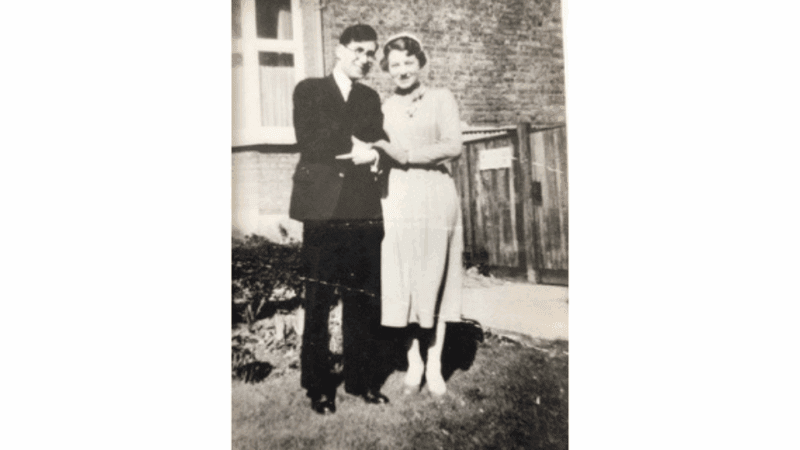
Kerry’s story
Kerry reflects on her mum's dementia journey and her experience doing two of Dementia UK’s virtual event challenges.
Living with dementia can bring a range of challenges, so it’s important for a person with the diagnosis to look after their health and wellbeing so they can stay as physically and mentally well as possible. Small changes, such as eating well, keeping up with medical appointments and taking part in physical activity, can have a significant impact on their quality of life. Our specialist Admiral Nurses provide advice on staying healthy with dementia.
While there is no cure for dementia, taking steps to stay healthy can have a positive impact on the person’s quality of life. For example, being physically active can help them retain their mobility so they can maintain their independence. Eating well can reduce the risks of other health conditions that could make their dementia symptoms worse. And making sure they have social contact can reduce the risk of loneliness and provide mental stimulation to keep the brain active.
A healthy, balanced diet will help to keep the person with dementia in good physical health. It will reduce the risk of developing or worsening conditions like diabetes, heart disease and stroke, which may have an impact on their symptoms. It will also help them maintain a healthy weight.
For most people, a healthy diet includes:
Food and drinks that are high in fat, sugar or salt – such as crisps, cakes, sweets, biscuits, butter, ice cream and sugary soft drinks – should be consumed less often and in smaller amounts.
The NHS Eatwell Guide is a helpful tool for following a healthy diet. It breaks down what types of food are in each food group and how much the person should eat on a day-to-day basis.
Many people with dementia are prone to dehydration, often because they don’t recognise the signs of thirst or forget to drink. It’s important to help the person stay hydrated by encouraging them to drink 1.5 litres of fluid a day (about six to eight glasses). This can include water, hot drinks, squash, fruit juice and milk. Foods that are high in fluids, such as custard, jelly, yoghurt, ice cream, soup and casseroles, can also be helpful in staying hydrated, especially for a person who finds it hard to drink.
Read more about staying hydrated.
While many people with dementia enjoy an alcoholic drink, it’s best to keep alcohol to a minimum as it can worsen confusion and increase the likelihood of falls. There are many good alternatives, including low-or zero-alcohol wine, beer and spirits, and mocktails. Find out more about the connection between alcohol and dementia.
Making mealtimes calm and enjoyable is an important way to make sure that the person you are caring for stays nourished and hydrated. Ways to create a relaxed and positive atmosphere include:
Our information on eating and drinking for people with dementia provides helpful tips to help you support the person you care for with eating, drinking and weight management.
As far as possible, a person with dementia should be supported to be physically active. Exercise has physical health benefits, can boost mood and often provides vital social contact.
Some of the benefits of regular physical movement include:
The type of exercise the person does will depend on their physical and mental abilities, but good options include:
In some areas, there are specific fitness activities for people with dementia, such as dementia-friendly exercise classes or swimming sessions – contact your local leisure centre to see what is available.
People with young onset dementia (where symptoms develop before the age of 65) in particular may be fit and active. If they like to run or cycle but may become confused or disorientated if they go out alone, teaming up with an exercise buddy or joining a club can be helpful.
Too much physical activity can be tiring for a person living with dementia, so it is important to strike a balance and make sure you allow regular rest breaks and recovery time.
If the person with dementia feels anxious or disoriented when going out alone, or would be vulnerable, going with them or asking another family member or friend to be an exercise buddy can be helpful.
As the person’s condition progresses, you may need to adapt their activities to suit their changing physical and mental abilities. For example, going swimming at quieter times may be beneficial if they find loud and busy spaces overwhelming, or joining an exercise class specifically for people with dementia might suit them if they struggle to follow instructions.
If the person with dementia has mobility problems, you can still support them to take gentle exercise, for example chair-based exercises, stretches, or just a walk around the house or garden.
Mental health is just as important as physical health. Mood changes are common in people with dementia, but ensuring the person receives mental and emotional support will help them live as well as possible with the diagnosis.
If the person is experiencing ongoing low mood or anxiety, please speak to their GP. It is often thought that people with dementia cannot experience anxiety or depression, but this is not the case, so don’t put off seeking support.
Following a consistent daily and weekly routine can help the person feel settled and understand what to expect, reducing confusion and avoiding unpredictable events that might cause distress.
Maintaining social contact is important for the person’s mental health. This could include spending time with family, friends and pets; taking part in groups and activities (either general community groups or those for people with dementia); visiting day centres or memory cafés; going on day trips; or being supported by a volunteer or befriender.
You might need to adapt social situations so they are easier to manage – for example, you could scale down gatherings to a few people at a time or provide a quiet ‘breakaway’ space at larger get-togethers like weddings.
Taking part in meaningful activities can help the person maintain their independence, use their skills and do something they enjoy while keeping their mind active. Some activities may need to be adapted to suit the person’s abilities (for example, listening to audiobooks may be easier than reading) but activities that bring them joy and engage their brain will contribute to better mental wellbeing.
Support the person to maintain their independence with everyday living activities, including their employment if they still work. Concentrate on their strengths rather than on their limitations. Focus on achievable daily goals (eg, “Today, I will do the shopping”), not ambitious long-term ones.
You might need to look at ways to adapt the person’s home to make it as safe and comfortable as possible and make it easier for them to manage independently.
While sleep disturbances are common in people with dementia, getting enough sleep is important for the person’s overall health, as well as helping them manage their symptoms. A lack of sleep can impact concentration, mood and cognitive function. Try our tips to encourage healthy sleep habits.
Dementia may make it harder for someone to manage their own healthcare. It may also mean that health issues go unnoticed for longer, for example if the person has difficulty communicating that they feel unwell or in pain.
It is important for the person with dementia to attend regular check-ups for any conditions such as diabetes or heart disease, take their prescribed medications and ensure these are reviewed when necessary. You can discuss ways to help them stay independent with their healthcare with their GP or pharmacist, for example by using technology for medication reminders and pre-filled pill dispensers.
Support the person to attend GP appointments and any other health screening they are invited to, for example blood pressure monitoring, blood tests, breast screening and bowel cancer screening. Help them keep up to date with dental, hearing and eyesight checks, and make sure they receive flu and Covid jabs if they are eligible. You can also speak to their GP about whether they can receive shingles and pneumonia vaccines.
Many people with dementia are more prone to infections. This could be for a number of reasons, for example difficulty with staying hydrated, leading to urinary tract infections (UTIs), or struggling with personal hygiene which could cause any broken skin to become infected.
To help the person stay on top of their health, look out for signs of illness and changes in physical health, memory, concentration or mood. Make sure you seek advice from a GP if there are any concerns about their health.
To speak to a dementia specialist Admiral Nurse about staying healthy or any other aspect of dementia, please call our Helpline on 0800 888 6678 (Monday to Friday 9am-9pm, Saturday and Sunday 9am-5pm), email helpline@dementiauk.org or book a phone or video call appointment with an Admiral Nurse.

Kerry reflects on her mum's dementia journey and her experience doing two of Dementia UK’s virtual event challenges.

Safia, a dementia specialist Admiral Nurse for the Black, African and Caribbean Communities, speaks to Elene, whose mum lived with dementia. They reflect on the importance of culturally appropriate dementia care and support.

Claire's story shares the loss of both her parents, how Admiral Nurse Simon helped her and why she has donated to Dementia UK.
There are a range of reasons someone with dementia may resist help with their health, including denying that they need support, anxiety in medical settings or not realising that they are unwell. You are likely to know the person best, so thinking about what motivates them and using this to encourage them to accept help can be useful.
Make sure you are kind, empathetic and patient with the person when talking to them about their health needs to help them feel understood and supported while trying to find a solution.
People with dementia are at higher risk of some conditions and complications, particularly in the later stages, such as falls, incontinence, difficulties with swallowing, infections and heart conditions. Because of this, it is important that the person attends their medical appointments, takes their medication as prescribed and is seen by a health professional if there are sudden or pronounced changes in their physical or mental abilities, or if you suspect they are unwell or in pain.
Sometimes, a person with dementia will resist taking their medication. This could be for a range of reasons, such as taste, texture, difficulty swallowing, or simply not recognising the need. You can speak to the professional who prescribed the medication to determine if there is another way for the person to take it if they are struggling, such as through a liquid solution or patch.
Finding an activity that the person enjoys can help encourage them to be active. This might be an organised activity like golf, bowls, dancing or swimming, or simple everyday activities like gardening or taking a dog for a short walk. Taking part in the activity with the person – or asking another family member or friend to join them – can also motivate them to be involved and make it more enjoyable.